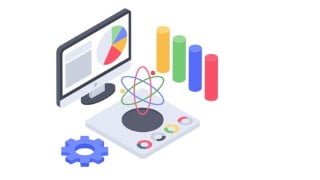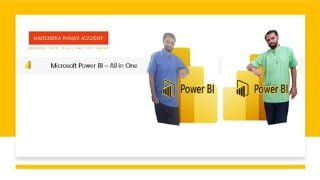Power Apps/Power Automate /Power BI for beginners
Learn how to build custom business apps without coding using Power Apps. Connect to various data sources, create multiple screens, and automate workflows with Power Automate. Transform your data into visually immersive insights with Power BI. This course is perfect for beginners looking to explore the capabilities of Power Apps, Power Automate, and Power BI.
What you’ll learn
- Design and build apps
- Build Apps from Scratch
- Build Apps from data sources
- Build Apps from templates
- Publish and view your apps from any device.
- Connect your apps to a variety of data sources
- Build Apps with multiple screens
- Create a flow that automatically adds data from another data source.
- Create a flow that runs on a schedule
- Create a flow to send push notification when files are added to a location
- Share a flow that your team
- Import and export flows
- Connecting to various data source with Power BI
- Clean and transform data
- Create visuals from data source
- Publish reports and visuals to Power BI Service
- Transform less structured data
Show moreShow less
Power Apps is a suite of apps, services, and connectors, as well as a data platform, that provides a rapid development environment to build custom apps for your business needs. Using Power Apps, you can quickly build custom business apps that connect to your data stored either in the underlying data platform (Microsoft Dataverse) or in various online and on-premises data sources (such as SharePoint, Microsoft 365, Dynamics 365, SQL Server, and so on).
Learning to code isn’t necessary for app development. Anyone can build an app without coding. All you need to do is find the right app builder to accommodate your needs. Then it’s just a matter of learning to use that platform, adding your features, and customizing the look and feel of the app with your own branding.
A no-code app builder is actually as straightforward as the name implies—it’s development software that allows users to create apps without needing to know how to write code. Originally crafted for teammates without coding experience, this type of development helps anyone create fully functional apps via a simple visual editor.
With a no-code app builders’ declarative interface, you’re drag-and-dropping pre-coded elements exactly where you want them, and the code follows suit. It’s not that coding isn’t happening—it’s that the elements have already been built behind the scenes, and you’re just telling them where to go. With a combination of cloud-based spreadsheets like Excel, Google Sheets etc. Housing your data and an idea of how you want to display that information, it’s surprisingly simple. You’ll be deploying apps in no time.
Power Automate is an online workflow service that automates actions across the most common apps and services. For example, you can create a flow that adds a lead to Microsoft Dynamics 365 and a record in MailChimp whenever someone with more than 100 followers tweets about your company. When you sign up, you can connect to more than 500 services, and can manage data either in the cloud or in on-premises sources like SharePoint and Microsoft SQL Server.
What can you do with Power Automate?
You can use Power Automate to automate workflows between your favourite applications and services, sync files, get notifications, collect data, and much more.
For example, you can automate these tasks:
Instantly respond to high-priority notifications or emails.
Capture, track, and follow up with new sales leads.
Copy all email attachments to your OneDrive for Business account.
Collect data about your business, and share that information with your team.
Automate approval workflows.
A common use of Power Automate is to receive notifications. For example,
you can instantly receive an email or a push notification on your
phone whenever a sales lead is added to Dynamics 365 or Salesforce.
You can also use Power Automate to copy files. For example, you can ensure that any file that’s added to Dropbox is automatically copied to SharePoint, where your team can find it.
Power BI is a collection of software services, apps, and connectors that work together to turn your unrelated sources of data into coherent, visually immersive, and interactive insights. Your data may be an Excel spreadsheet, or a collection of cloud-based and on-premises hybrid data warehouses. Power BI lets you easily connect to your data sources, visualize and discover what’s important, and share that with anyone or everyone you want.
Power BI consists of several elements that all work together, starting with these three basics:
A Windows desktop application called Power BI Desktop.
An online SaaS (Software as a Service) service called the Power BI service.
Power BI mobile apps for Windows, iOS, and Android devices.
These three elements—Power BI Desktop, the service, and the mobile apps—are designed to let you create, share, and consume business insights in the way that serves you and your role most effectively.
Beyond those three, Power BI also features two other elements:
Power BI Report Builder, for creating paginated reports to share in the Power BI service. Read more about paginated reports later in this article.
Power BI Report Server, an on-premises report server where you can publish your Power BI reports, after creating them in Power BI Desktop.
How you use Power BI may depend on your role in a project or on a team. Other people, in other roles, might use Power BI differently.
For example, you might primarily use the Power BI service to view reports and dashboards. Your number-crunching, business-report-creating coworker might make extensive use of Power BI Desktop or Power BI Report Builder to create reports, then publish those reports to the Power BI service, where you view them. Another coworker, in sales, might mainly use the Power BI phone app to monitor progress on sales quotas, and to drill into new sales lead details.
If you’re a developer, you might use Power BI APIs to push data into datasets or to embed dashboards and reports into your own custom applications. Have an idea for a new visual? Build it yourself and share it with others.
You also might use each element of Power BI at different times, depending on what you’re trying to achieve or your role for a given project.
Who this course is for:
- Beginners to Power Apps
- Beginners to Power Automate
- Beginners to Power BI
User Reviews
Be the first to review “Power Apps/Power Automate /Power BI for beginners”
You must be logged in to post a review.







There are no reviews yet.